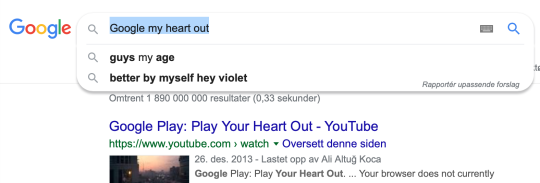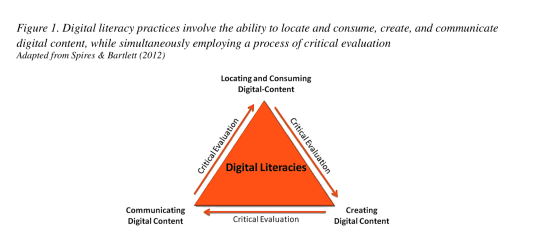I was starting to think about my online representation. I have been on the web since mid 1990s. That indicates some traces of me on the web. And there is, I’ll get back on that. Thinking about online traces, I started Googling. I have worked in the field of ICT and learning for many years. I consider myself quite digital competent, and my digital literacy should be high. Nevertheless, I startet wondering how to be smart Googling, I mean, how to get what you want from Google. You know there are smart ways of getting exact and good answers, but I at least tend to forget the smart ways, and just Google my heart out!

But as I was wondering about my online representation, I started asking Google for smart searches. For instant did Google remind me that I can do site searches by putting “site:” and the site address after your search word. That way you will search for the word, on the site that you choose. This apparently is a good idea since Google is better at searching on a specific site than the search engine at that site. I had to try this of course, and so I found a video of my daughter from 16 years back, from a TV appearance from when she was 4. That was such a treat! It made my day especially since she is now far away in a different country studying and I have not seen her for quite some time.
This little treasure of a film clip stated me wondering how my digital literacy or competance has developed since earyl 2000. I have experimented online with different technology and social media since then. I studied for a masters degree online in 2006-2008, and started blogging, collaborating online and so forth. Looking back I can find quite a few trances from that online. But have I really been out there? Am I what David White would call a resident or am I mere a visitor? (https://youtu.be/sPOG3iThmRI). I’m sure the answer is “both”. In many aspects I am a resident. I have tested and written about Second Life used for teaching and learning purposes. I have used and spoken about web 2.0 tools. I have set up and facilitated blog as a way of learning and sharing with each other in learning networks, and written about the experiment. And I can go on. But all this has been as part of my professional life, and my role there. Of course it is hard to distinguish professional and privat, but I can see that when it comes to my activities as a private person (if there are such a thing), I am more reluctant at sharing my thoughts and knowledge. I have used facebook since 2007 and twitter since 2008, but I don’t share that much. I have Instagram, but mostly as a way of 1) saving good ideas from others, and 2) following friends. I use Snapchat, but that is mostly instant communication and silly updates to and from kids and friends. I use messenger for the same purpose, and for group updates and chats. So in my personal life, I am more a consumer than a producer of digital media? Or am I? I don’t do much of “remixing”, something that Doug Belshaw referes to as “being in the heart of digital literacy” (Belshaw, TEDxWarwick March 22, 2012). I mean, I could remix more, I know how. I just don’t do much of it. Unless it is for work that is.
Does that mean I am not digital literate? Am I only a visitor? Do I have to remix to be literate? There are some varieties to the definition of digital literacy. Or maybe it is more accurate to say that it evolves? I think maybe the focus on “remix” is such an evolvement. Digital literacy have often been referred to as finding, evaluating, creating and communicating digital content, for instant Medlock, Spires and Kerkhoff who defines digital literacy and practices as “Digital literacy practices involve the ability to locate and consume, create, and communicate digital content, while simultaneously employing a process of critical evaluation”.

Creating digital content is for instant what I am doing now, writing a blog post. Since I will post it, I am also communicating it. And I have of course been locating and consuming during this process of finding knowledge, references, models and so forth. What would the difference between “creating” and “remixing” content be? I believe remixing is referring to taking something already out there on the web and changing it in some sense so that it be new, or something else. This could also be called creating. Remixing means something more. It indicates a new, creative and artistic competence? If remixing is to be understood in this sense, I wonder whether it should be understood as a key element of digital literacy? At least this points more to the divide between visitor and resident notion than to digital natives and immigrants. I don’t think all “digital natives” are naturally artistic oriented, or feel the need to remix to make a statement. I think we are creative depended on the situation and the task, most of us. And creativity comes in different shapes and colors.
[TEDx Talks]. (2012, March 22). The essential elements of digital literacies: Doug Belshaw at TEDxWarwick retrieved from https://youtu.be/A8yQPoTcZ78
[jiscnetskills]. (2014, March 10). Visitors and Residents retrieved from https://youtu.be/sPOG3iThmRI
Medlock Paul, Casey & Spires, Hiller & Kerkhoff, Shea. (2017). Digital Literacy for the 21st Century. In M.Khosrow-Pour (ed.) Encyclopedia of Information Science and Technology, Foourth Edition (pp.2235-2242). Hershey PA: IGI Global
